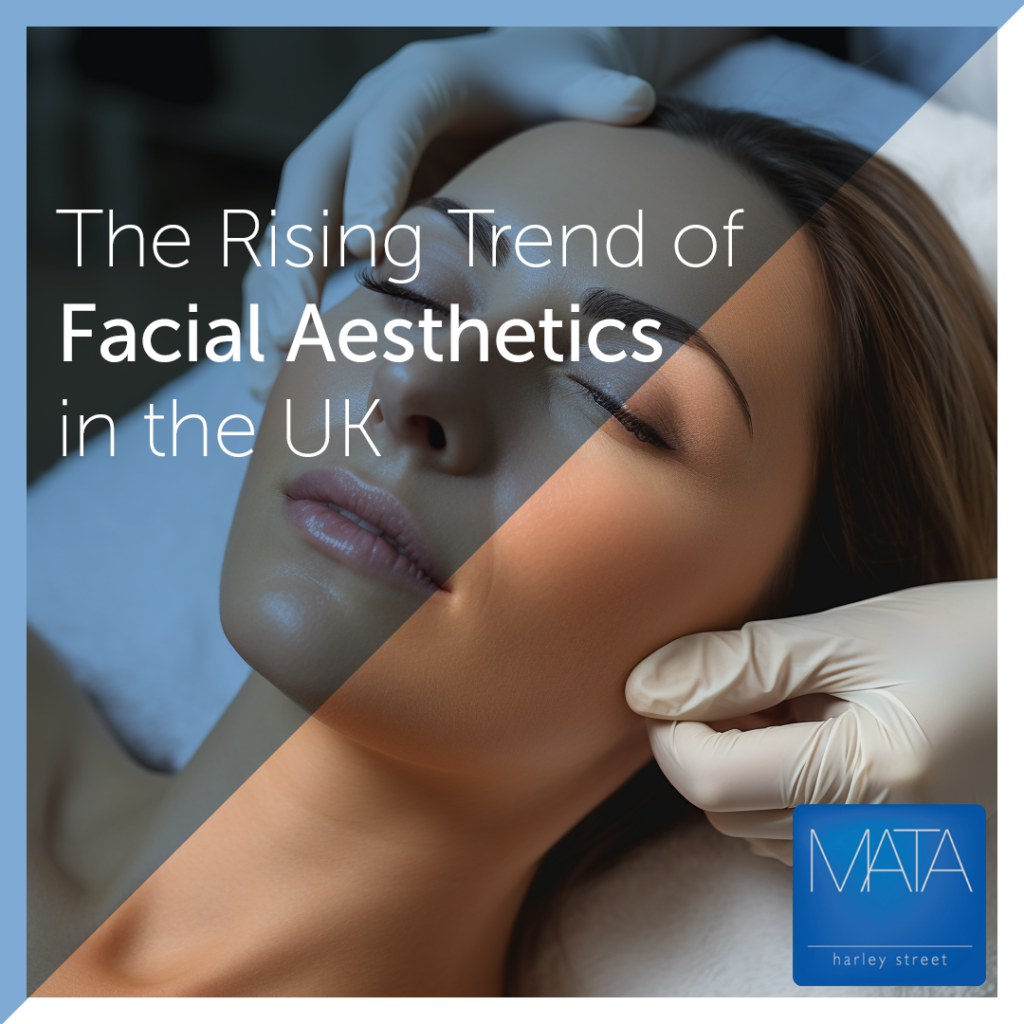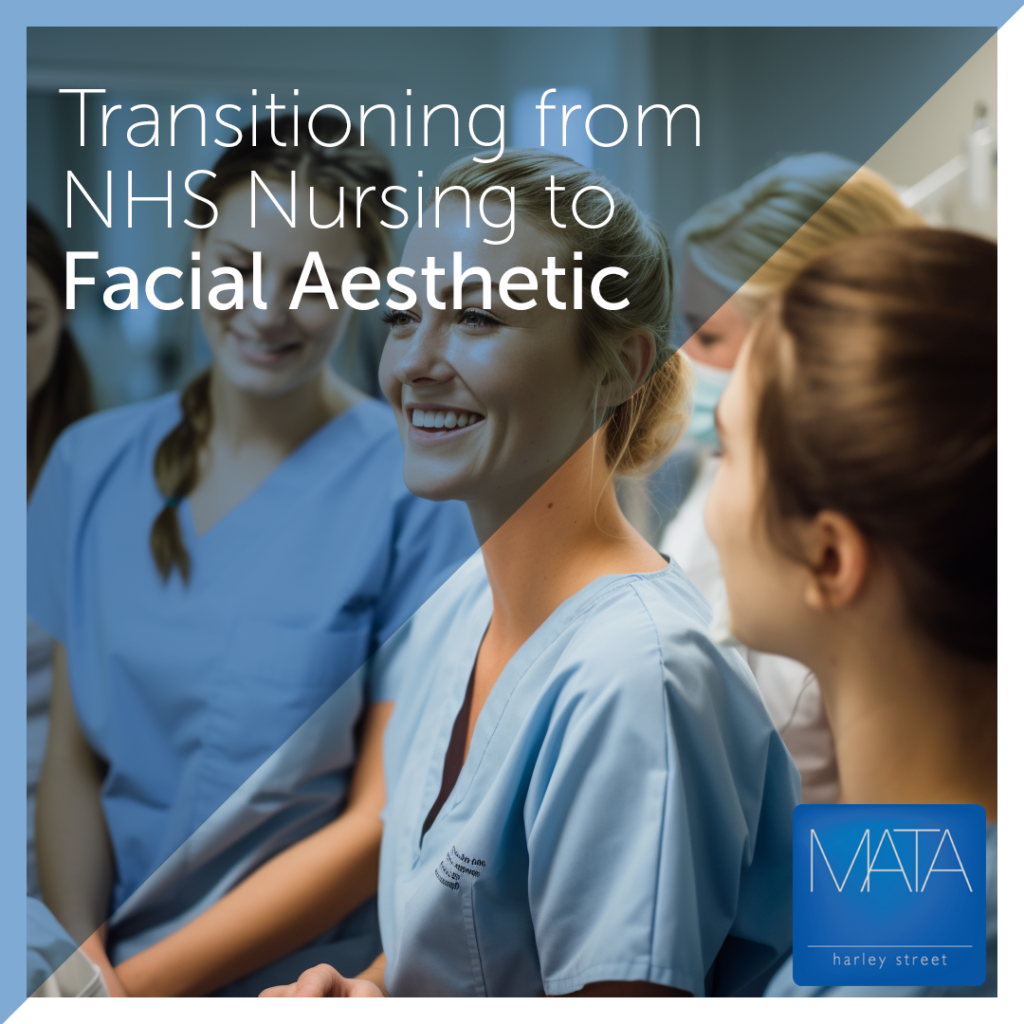Black Friday 2023 has now finished. For our latest offers, please speak to the team to find out more.
Thank you, Team MATA.
Exploring the Rising Trend of Facial Aesthetics in the UK

Across the UK, the demand for facial aesthetics has surged dramatically in recent years (Furness, 2022). This presents a burgeoning opportunity for National Health Service (NHS) professionals, such as nurses, doctors, and dentists, to diversify their career paths and tap into this ever-expanding sector.
Indeed, who could be better suited to meet this demand than our highly trained and dedicated NHS professionals? It’s a natural transition, bringing in valuable medical expertise to a field that greatly benefits from it. With the right training and support, this could be a transformative career move.
We at Medical and Aesthetics Training Academy (MATA) are pioneers in the industry and creators of the acclaimed Level 7 Diploma in Facial Aesthetics, are perfectly positioned to provide the necessary training for this career transition. Having co-created the Level 7 Certificate in Facial Aesthetics and offering training in various UK cities, MATA strives to improve safety in facial aesthetics through high-quality training, available exclusively to medical professionals.
Let’s explore the rise in facial aesthetics, the opportunities this presents for NHS professionals, and how MATA can be instrumental in this transition.
The Rise in Facial Aesthetics
In a society where Instagram filters and high-definition video calls are becoming the norm, the demand for aesthetic treatments is at an all-time high (Savage, 2021). The UK market has seen a particularly significant increase, with non-surgical treatments like Botox and dermal fillers becoming increasingly popular. This growth is expected to continue, with the facial aesthetics market predicted to reach £3.6 billion by 2025 (MarketsandMarkets, 2020).
The reasons behind this are multifaceted. Advances in technology, social media influence, a growing ageing population, and the quest for ‘perfection’ are key contributors to this trend (Savage, 2021).
Opportunities for NHS Professionals
For NHS professionals, the aesthetics industry provides an opportunity to leverage their existing skills in a new, lucrative way. Diversifying into aesthetics can add an additional revenue stream, while still maintaining a role within the NHS. The flexible working hours associated with aesthetics are also appealing, allowing for a more manageable work-life balance.
A career in aesthetics is not merely about increasing income. It’s about using your skills to help people feel better about themselves and increase their confidence. As a medical professional, you already possess the interpersonal skills and medical knowledge that can make a real difference in this field.
Why Train with MATA?
Training with MATA ensures you will receive the highest quality of education in facial aesthetics, delivered by a plastic surgeon led team of qualified medical professionals. With a commitment to patient safety, you can be confident that MATA’s training will equip you with the knowledge and skills necessary to provide safe, effective treatments.
With MATA, you’re not just training – you’re joining a community of professionals who are leading the way in aesthetics. Training is available in London, Manchester, Leeds, Cardiff, and Glasgow, providing nationwide accessibility.
By the end of your training, you will hold a Level 7 Diploma in Facial Aesthetics, a qualification that resonates with professionalism, expertise, and safety in the industry.
It’s time to broaden your career horizons and enter the dynamic world of facial aesthetics. MATA is here to guide you through this exciting journey.
FAQ
Facial aesthetics refers to non-surgical treatments that aim to rejuvenate, enhance, and balance facial features. These treatments include Botox, dermal fillers, chemical peels, and laser therapy.
The demand for facial aesthetics is rising due to societal factors such as social media influence, technology advances and an ageing population.
For NHS professionals, aesthetics offers an opportunity to apply their medical skills in a lucrative field, add a supplementary income stream, and enjoy more flexible working hours.
MATA is a leading training academy specialising in facial aesthetics for medical professionals. They offer courses led by qualified plastic surgeons and are the creators of the Level 7 Diploma in Facial Aesthetics.
MATA’s training includes theoretical study, practical hands-on sessions, and mentorship. The curriculum covers a broad range of non-surgical treatments such as Botox, dermal fillers, and chemical peels.
After training with MATA, you’ll receive the Level 7 Diploma in Facial Aesthetics, a highly regarded qualification in the industry that emphasises safety, professionalism, and expertise.
Yes, many professionals choose to offer aesthetic treatments alongside their NHS role, benefiting from the additional income and flexible working hours aesthetics provides.
Yes, by training with MATA, you join a community of professionals who are leading the way in the aesthetics industry.
You can get started by exploring the available courses. Our friendly team is on hand to answer any queries and guide you through the enrolment process.
The Future of Facial Aesthetics & Why Nurses are Leading the Way

In the dynamic and ever-evolving world of healthcare, a new trend is emerging: nurses are increasingly leading the way in the field of facial aesthetics. This shift is not accidental but a result of the unique skills and perspectives that nurses bring to the table. As pioneers in the training industry, MATA, a plastic surgeon-led training academy, is at the forefront of this trend, offering specialised facial aesthetics training for doctors, dentists, and, notably, nurses.
Nurses have always been an integral part of the healthcare system, providing patient-centred care and demonstrating exceptional clinical skills. Their role in facial aesthetics is a natural extension of these skills, allowing them to deliver safe and effective treatments in a rapidly growing field. This shift is not only a testament to the versatility and adaptability of nurses but also a reflection of the changing landscape of healthcare, where patient needs and preferences are increasingly diverse and complex.
MATA, co-creators of the Level 7 Certificate in Facial Aesthetics and creators of the Level 7 Diploma in Facial Aesthetics, is championing this shift. Our training programmes, offered in London, Manchester, Leeds, Cardiff, and Glasgow, are designed to equip nurses with the knowledge and skills they need to excel in facial aesthetics. These programmes are not just about teaching techniques; they are about fostering a deep understanding of facial aesthetics and its role in enhancing patient wellbeing and confidence.
The training provided by MATA is comprehensive and rigorous, reflecting the complexity and importance of facial aesthetics. It covers a wide range of topics, from anatomy and physiology to the latest techniques and technologies in facial aesthetics. The training also emphasises the importance of patient safety and ethical practice, ensuring that nurses are well-equipped to deliver treatments that are not only effective but also safe and ethical.
The future of facial aesthetics is here, and nurses are leading the way. With the right training and support, they can continue to drive innovation and improve patient safety in this exciting field. As more and more nurses embrace this career path, we can expect to see a healthcare landscape that is more diverse, more responsive to patient needs, and more innovative.
Nurses have a unique set of skills and a patient-centred approach that makes them ideal for leading in the field of facial aesthetics. Their clinical skills, combined with their understanding of patient needs and preferences, make them well-suited to deliver safe and effective facial aesthetics treatments.
MATA offers the Level 7 Certificate and Diploma in Facial Aesthetics – alongside – Foundation and Advanced Training -specially designed for medical professionals including nurses. These programmes cover a wide range of topics, from anatomy and physiology to the latest techniques and technologies in facial aesthetics. They also emphasise patient safety and ethical practice.
Training is crucial in facial aesthetics because it ensures that treatments are delivered safely and effectively. It equips practitioners with the knowledge and skills they need to deliver treatments that meet patient needs and preferences, and it fosters a deep understanding of the role of facial aesthetics in enhancing patient wellbeing and confidence.
MATA’s training programmes are designed for medical professionals, including doctors, dentists, and nurses. This reflects MATA’s commitment to patient safety and quality of care, as medical professionals have the clinical skills and ethical training to deliver safe and effective facial aesthetics treatments.
Unleashing Your True Potential -Transitioning from NHS Nursing to a Thriving Career in Facial Aesthetics

Are you an NHS nurse feeling constrained by the limitations of traditional nursing roles? Are you yearning for a career shift that allows you to use your medical skills in innovative and challenging ways? If so, a transition to Facial Aesthetics could be the answer you’re looking for. This emerging field is ripe with opportunities for personal and professional growth, and it could just be the breath of fresh air your nursing career needs.
But how exactly do you make the transition? What challenges might you face along the way, and how can you overcome them? That’s exactly what we’ll be exploring in this comprehensive guide.
Why Consider a Career in Facial Aesthetics?
First, let’s look at why Facial Aesthetics is such an appealing field for many NHS nurses. In addition to offering a refreshing change from traditional nursing roles, a career in Facial Aesthetics allows you to combine your passion for healthcare with the art of beauty. You’ll be able to transform lives by enhancing clients’ confidence and self-esteem, and you’ll be working in an industry that is at the forefront of medical and cosmetic advancements.
Furthermore, a career in Facial Aesthetics can provide a much-needed respite from the long hours and high stress levels that are often associated with NHS nursing. The flexibility offered by this field means that you can enjoy a healthier work-life balance, giving you more time to spend with family or to pursue personal interests.
Navigating the Transition – The Challenges and Their Solutions
While the transition from NHS nursing to Facial Aesthetics can be incredibly rewarding, it’s not without its challenges. But the good news is that these hurdles are far from insurmountable.
One of the main concerns many nurses have is the lack of experience or knowledge in aesthetics. But this is where MATA comes in. We provide comprehensive training courses specifically designed to equip NHS nurses with the necessary skills and knowledge to excel in the field of Facial Aesthetics.
Kickstarting Your New Career with MATA
At MATA we understand the unique challenges that NHS nurses face when transitioning to Facial Aesthetics. That’s why we’ve designed our courses to provide a smooth transition. From anatomy and physiology to consultation skills and hands-on training, we cover every aspect of Facial Aesthetics to ensure that you’re fully prepared for your new career.
FAQs
To help you gain a clearer understanding of the transition from NHS nursing to Facial Aesthetics, we’ve compiled a list of frequently asked questions (FAQs). We hope these will help to dispel any doubts or uncertainties you might have.
- I have no experience in Facial Aesthetics. Can I still make the transition?
- Absolutely! Our courses at Matacourses.com are designed to accommodate all experience levels, providing you with the necessary knowledge and skills to excel in Facial Aesthetics.
- Will I be able to manage my work-life balance better in Facial Aesthetics?
- Yes, one of the greatest advantages of a career in Facial Aesthetics is the flexibility it offers, often allowing for a healthier work-life balance.
- Will my nursing skills be transferable to a career in Facial Aesthetics?
- Absolutely. Your nursing skills are incredibly valuable and highly transferable, forming a strong foundation for a successful career in Facial Aesthetics.
- What kind of support will I get from MATA during my transition?
- At MATA, we provide comprehensive support throughout your learning process, from tailored courses to experienced tutors and hands-on training.
- How long will it take to transition to Facial Aesthetics?
- The duration can vary depending on your commitment and pace of learning. However, our courses are designed to facilitate a smooth and swift learning.
- Can I transition part-time or do I have to leave my current nursing role entirely?
- A6: Absolutely, you can transition part-time. Many of our students balance their current nursing roles while training with us.
- Are there opportunities for career advancement in Facial Aesthetics?
- Yes, the Facial Aesthetics industry is ever-growing, offering numerous opportunities for professional development and career advancement.
- What is the potential income in Facial Aesthetics compared to NHS nursing?
- While income can vary, many find the earning potential in Facial Aesthetics to be significantly higher than in traditional nursing roles due to the ability to work privately.
- Is Facial Aesthetics a sustainable long-term career?
- Absolutely, Facial Aesthetics is a rapidly growing field with increasing demand, making it a viable and sustainable career choice.
- How will I know if Facial Aesthetics is the right fit for me?
- If you have a passion for healthcare, an interest in the beauty industry, and a desire for a more flexible and creative career, Facial Aesthetics could be an excellent fit for you!
The Art and Science of Facial Symmetry: Aesthetic Principles and Practice

Facial symmetry is one of the core principles that underpin the aesthetics of the human face. The symmetrical arrangement of facial features, from the position and shape of the eyes to the proportion of the nose and mouth, plays a pivotal role in how we perceive beauty and attractiveness.
However, perfect facial symmetry is a myth. Natural human faces are not perfectly symmetrical, and slight asymmetries are normal, often contributing to a person’s unique charm. As medical professionals, understanding this delicate balance between symmetry and asymmetry is crucial in facial aesthetics.
The concept of facial symmetry transcends cultural and societal boundaries. Studies suggest that we are innately drawn to symmetrical faces, viewing them as more attractive, healthy, and desirable. But why is this? Some theories posit that symmetry signals good health and genetic quality, crucial factors from an evolutionary perspective.
The art of achieving facial symmetry through aesthetic procedures is complex. It requires an in-depth understanding of facial anatomy, an artistic eye, and a delicate hand. For example, in botulinum toxin treatments, the goal is not to create a perfectly symmetrical face, but to enhance natural symmetry while respecting the patient’s unique facial features. This approach requires both scientific knowledge and artistic sensibility.
Understanding the mathematical principle of the ‘Golden Ratio’ can further refine our appreciation of facial symmetry. This ratio, approximately 1.618, is considered aesthetically pleasing and has been used in art and architecture for centuries. In the context of facial aesthetics, the Golden Ratio can guide the assessment of facial proportions and guide treatment planning.
While working towards enhancing facial symmetry, it’s essential to consider the dynamic nature of the face. Static symmetry, when the face is at rest, may not translate to dynamic symmetry, observed when the face is in motion during speech or expressions.
Moreover, recognising that beauty does not lie solely in symmetry is vital. Each person brings their own unique features and characteristics, which contribute to their individuality. Instead of striving for perfect symmetry, the goal should be to enhance and harmonise the existing features to achieve a balanced and naturally appealing look.
Lastly, the psychology of facial aesthetics plays a significant role in this process. It’s essential to understand the patient’s perceptions of their own face, their desires, and their fears. Engaging in a comprehensive consultation process will ensure alignment between the professional’s expertise and the patient’s expectations, fostering trust and satisfaction.
The art and science of facial symmetry involve a sophisticated understanding of aesthetics, deep knowledge of facial anatomy, a keen artistic eye, and a sensitive approach to patient desires and expectations. By mastering these aspects, medical professionals can provide highly effective, personalised facial aesthetic treatments, bringing out the natural beauty in every face.
The Rising Demand for Aesthetic Procedures in the UK

Introduction
The ever-evolving landscape of healthcare is a testament to the progress of modern science, influenced by constant innovations, societal preferences, and the dynamic needs of patients. One of the most transformative sectors that have emerged in recent times within healthcare is aesthetic medicine, bringing forth new opportunities for growth and diversification of skills. For professionals, particularly those within nursing, aesthetics offers an exciting realm of possibilities, enabling a unique blend of healthcare and aesthetic satisfaction for patients.
In the UK, the past decade has witnessed an exponential increase in the demand for aesthetic procedures. Cosmetic treatments, previously dominated by surgical interventions, have seen a shift towards minimally invasive or non-surgical procedures. This trend has been fuelled by several factors, such as the influence of social media, the quest for ‘self-improvement’, and the accessibility and affordability of treatments. As per the British Association of Aesthetic Plastic Surgeons (BAAPS), there’s been a dramatic rise in non-surgical procedures, with botulinum toxin procedures (Botox) topping the list.
While surgical procedures may offer more permanent solutions, the appeal of non-surgical procedures lies in their simplicity, affordability, minimal recovery time, and the ability to offer natural-looking enhancements. Procedures such as Botox and dermal fillers have been at the forefront of this revolution, offering individuals a chance to smooth out wrinkles or enhance facial features with minimal downtime. These treatments, owing to their less invasive nature, often fall into the hands of various professionals, including dermatologists, plastic surgeons, and registered nurses, amongst others.
The increase in demand for aesthetic procedures has catalysed the growth of a thriving industry. According to a report by the British College of Aesthetic Medicine (BCAM), the UK aesthetic market is expected to reach £6.2 billion by 2025. This growth is driving a need for qualified practitioners who can deliver high-quality treatments. In response to this demand, the aesthetic medicine industry offers a lucrative and satisfying career path for those in healthcare professions, particularly nurses, who wish to diversify their skills and cater to this growing patient population.
Nurses possess a set of critical skills – compassion, efficient communication, dexterity, and patient care – all of which are transferable and highly valuable within the field of aesthetics. In the aesthetic sector, these skills can be honed and directed towards enhancing an individual’s self-esteem and body image, thereby improving overall wellbeing. However, the transition from traditional nursing to aesthetic medicine is not an immediate one; it requires a solid foundation in the core principles of aesthetics, familiarity with aesthetic products, and confidence in performing aesthetic procedures.
This is where specialist training plays a pivotal role. By equipping nurses with the requisite skills and knowledge, aesthetic training programmes help ensure that they can provide safe and effective treatments, meeting the industry’s high standards and the expectations of patients. As the creators of the Level 7 Diploma in Facial Aesthetics, the Medical and Aesthetic Training Academy (MATA) has been a pioneer in this respect, providing an educational pathway for nurses aspiring to make this career transition.
The Journey to Aesthetic Nursing
To guide this professional transition and ensure the provision of safe and effective aesthetic treatments, the Medical and Aesthetic Training Academy (MATA) offers the Level 7 Diploma in Facial Aesthetics. This comprehensive training programme, led by experienced plastic surgeons and specialists in aesthetics, stands as the gold standard in the UK for nurses looking to venture into aesthetic medicine.
The Level 7 Diploma in Facial Aesthetics stands on three core pillars, each designed to impart a robust understanding of the aesthetic industry, the science behind common procedures, and the practical skills to deliver effective treatments:
Clinical Knowledge: The online study component of the course covers seven comprehensive units, each accompanied by a short quiz. These units delve into the theoretical knowledge underlying aesthetic medicine, such as anatomy, skin ageing, patient assessment, and managing complications. In addition, students are expected to complete 40 short answer questions and three essays, reinforcing their understanding and allowing for any areas of uncertainty to be clarified.
Practical Training: Complementing the theoretical knowledge, the diploma also involves six practical training days. The first two days offer a foundation in Botox and Dermal Fillers, teaching nurses how to perform common treatments like smoothing out Crow’s Feet, Forehead Lines, Frown Lines, enhancing Lips, Cheeks, and addressing Marionette Lines. The following two days advance this training, covering treatments such as Bruxism and Hyperhidrosis via Botox, and addressing aesthetic concerns like Tear Trough, Jaw contouring, Temples, Nasolabial Lines, and Chin reshaping with Dermal Fillers. These hands-on training sessions offer delegates a safe and controlled environment to develop their technical skills under expert supervision.
Mentorship: Two mentorship days are incorporated into the programme to cement the learning experience. One day focuses on foundational treatments and the other on advanced treatments. These mentorship days provide an invaluable opportunity for nurses to become more experienced practitioners, learn their technique, and ask any questions they may have.
Each step in the training journey is designed to build on the previous, gradually guiding nurses from a strong foundational knowledge of aesthetic principles to a thorough practical understanding of aesthetic procedures. As students progress, they complete a logbook detailing their observed and performed treatments – a record of their practical experience that stands testament to their journey into aesthetic nursing.
Transitioning from nursing to aesthetic medicine is more than just acquiring a new set of skills. It’s about adapting to a new way of patient interaction, where the focus is on enhancing an individual’s confidence and self-image through aesthetic improvements. In this patient-centric field, nurses can truly leverage their strengths in communication, empathy, and patient care.
Through this comprehensive pathway, MATA’s Level 7 Diploma in Facial Aesthetics provides a well-rounded preparation for nurses seeking to make their mark in aesthetic medicine, ensuring that they step into their new roles as aesthetic nurses with confidence, competence, and a thorough understanding of their practice.
Benefits of Transitioning from Nursing to Aesthetic Medicine
Embarking on a journey from traditional nursing to aesthetic medicine with MATA’s Level 7 Diploma in Facial Aesthetics has distinct benefits that extend beyond the acquisition of new skills and knowledge. The field of aesthetic medicine offers opportunities for personal growth, improved work-life balance, and enhanced patient interaction that can be particularly appealing to nurses.
1. Autonomy and Entrepreneurship: Unlike traditional nursing roles, aesthetic medicine often allows for greater autonomy. Many aesthetic nurses choose to become self-employed or start their own practice, making critical business and clinical decisions. This pathway enables nurses to apply their medical knowledge in a new context while developing entrepreneurship skills. This transition can be empowering and professionally rewarding.
2. Work-Life Balance: Aesthetic medicine also tends to offer greater flexibility than traditional nursing roles, where shift work can be unpredictable and exhausting. With more control over their schedules, aesthetic nurses often achieve a healthier work-life balance, allowing them more quality time with their families and for themselves.
3. Financial Rewards: The field of aesthetic medicine can be financially rewarding, with potential earnings significantly higher than traditional nursing roles. Coupled with the autonomy of potentially owning a practice, aesthetic nurses can steer their financial future and achieve their personal and financial goals.
4. Patient Relationships: Aesthetic medicine also offers a different type of patient relationship. In contrast to traditional nursing, where patient interaction can be brief and often in periods of distress, aesthetic medicine allows for ongoing patient relationships. Treatments typically involve multiple visits, providing an opportunity for nurses to build rapport, trust, and help their patients feel better about themselves.
5. Continued Professional Development: The aesthetic field is constantly evolving, with new treatments, techniques, and products regularly entering the market. This means continual learning and professional development, which can be highly satisfying for those with a passion for their craft.
6. Use of Previous Skills: Even as they learn new procedures and techniques, aesthetic nurses continue to use many of the skills that they developed in their previous roles. These include patient assessment, administration of injections, management of side effects and complications, and patient aftercare.
To leverage these benefits, nurses need a comprehensive, high-quality education in aesthetic medicine. MATA’s Level 7 Diploma in Facial Aesthetics is designed to provide this education. The programme combines online study, practical training, and mentorship to prepare nurses for the unique challenges and rewards of a career in aesthetic medicine.
The Journey with MATA’s Level 7 Diploma in Facial Aesthetics
The journey towards becoming a certified aesthetic nurse with MATA’s Level 7 Diploma in Facial Aesthetics comprises a thoughtful blend of comprehensive practical training, mentorship, and self-paced online learning. This transformative path is designed to empower nurses to thrive in their new careers, combining their pre-existing medical expertise with new, specialised aesthetic skills.
The transition from nursing to aesthetic medicine with MATA’s Level 7 Diploma in Facial Aesthetics is indeed a rigorous one. However, the intensity and comprehensiveness of the course ensure that delegates emerge as confident, capable, and highly skilled aesthetic practitioners. With the backing of MATA, their journey into aesthetic medicine is a transformative and fulfilling endeavour that enriches their careers and the lives of their patients.
From Hospital Wards to Aesthetics: The Transformational Journey of an NHS Nurse

There are stories of courage, tenacity, and transformation that often go unheard. One such tale is of an NHS nurse, Sarah, whose career trajectory took a dramatic turn when she discovered the burgeoning field of aesthetic medicine.
The Rigours of NHS Nursing
Sarah’s medical journey began in the high-pressure environment of an NHS hospital. She loved her job, the patient interaction, and the profound difference she made in their lives. However, the relentless shifts and long hours began to infringe upon her family time, causing her to rethink her professional path.
The Epiphany
The turning point arrived when Sarah met an old colleague flourishing as an aesthetic practitioner. Intrigued by her friend’s work-life balance, increased income, and the deep connection with clients, Sarah contemplated a shift towards aesthetic medicine.
Embracing A New Path with MATA
Fuelled by her curiosity, Sarah enrolled in the Level 7 Diploma in Facial Aesthetics at the Medical and Aesthetics Training Academy (MATA). She valued the hands-on approach and the opportunity to work with real patients under the guidance of experienced professionals.
The Road to Success
Post-diploma, Sarah opened her aesthetics clinic. She discovered a new kind of satisfaction in helping clients boost their confidence and enhance their natural beauty. The improved financial situation was a welcome change, but what truly transformed her life was the newfound work-life balance.
Fulfilment and Professional Growth
Sarah’s inspiring journey from an NHS nurse to an aesthetic practitioner serves as a beacon for those contemplating a similar transition. It stands testament to the fact that it’s never too late to reshape your career towards personal fulfilment and professional growth.
Transition to Triumph: Embracing Aesthetic Medicine as a Nurse in the UK

Introduction
Imagine transforming your nursing career, stepping into an industry that seamlessly blends healthcare, art, and science. Welcome to the world of aesthetic medicine – a sector that not only offers more autonomy and financial reward, but also enriches your patient relationships and opens new avenues for growth and development.
The Rise of Aesthetic Medicine
Aesthetic Medicine is on the rise in the UK. With a growing demand for minimally invasive procedures like Botox, fillers, and chemical peels, the industry’s growth trajectory shows no signs of slowing down. While once perceived as an exclusive luxury, aesthetic treatments are now viewed as part of regular self-care routines. This change in perspective provides healthcare professionals a golden opportunity to diversify their careers while meeting a significant demand.
Why Should Nurses Consider Aesthetics?
Nurses are primed to transition into aesthetic medicine because of their empathetic nature, technical prowess, and understanding of patient care. The journey from being an NHS nurse to a facial aesthetic practitioner offers myriad benefits.
Financial Independence
While the NHS is a rewarding career path, it is no secret that nursing can be financially challenging. Aesthetics, on the other hand, offers greater earning potential with nurses often earning substantially more than their NHS counterparts.
Flexible Work Schedule
With aesthetics, nurses have the freedom to choose their working hours and practice independently. This flexibility offers a work-life balance that can be hard to achieve in a traditional hospital setting.
Personal Growth and Patient Relationships
Working in aesthetics allows for more one-on-one time with patients. As a nurse-turned-aesthetician, you will help patients enhance their self-esteem and feel more confident, which can be deeply fulfilling.
Navigating the Transition with MATA
The Medical and Aesthetics Training Academy (MATA) provides the most comprehensive pathway for nurses to transition into aesthetic medicine. Our Level 7 Diploma in Facial Aesthetics is a surgeon-led training program that equips medical professionals with the skills they need to become safe and competent practitioners.
The Road Ahead
A career switch may seem daunting but remember – each step you take is a stride towards a brighter future. As the aesthetic industry continues to flourish, nurses across the UK are beginning to explore the opportunities it offers. So, if you’re a nurse seeking career advancement, financial stability, and a chance to make a profound impact on your patients’ lives, aesthetic medicine might just be the answer.
Evolving Beauty Standards and Medical Aesthetic Procedures in the UK
In the fluid landscape of beauty standards, the UK’s medical aesthetics industry stands as a testament to constant evolution. From advocating for natural looks to promoting individual uniqueness, aesthetic practitioners are aligning treatments with the changing aesthetics zeitgeist, supported by top-notch training from academies like MATA.
Historically, societal beauty standards have never been static. Today, the role of social media in shaping and sharing these standards is significant. Amidst this flux, an encouraging trend towards inclusive and authentic beauty is emerging. Backed by skilled practitioners, the UK’s medical aesthetics industry finds itself at the forefront of this evolution.
According to a study by the British Association of Aesthetic Plastic Surgeons (BAAPS), there is a decline in invasive surgeries in the UK. Instead, non-surgical procedures are gaining preference due to their natural-looking results. These trends reflect the shift in beauty standards, with aesthetic procedures becoming a means of expressing individual identity.
Crucial to this evolution is high-quality training, such as that offered by MATA, the Medical and Aesthetics Training Academy. MATA’s comprehensive training equips medical professionals with the required skills and understanding of patients’ evolving needs. This allows for a more personalised aesthetic journey, prioritizing what’s innately beautiful and unique in every individual.
As the medical aesthetics industry in the UK moves towards a more nuanced understanding of ‘natural’ beauty, it invites open conversations among professionals and patients. The challenge lies in avoiding polarising the discourse. It’s crucial to remember that the essence of the aesthetic industry is the freedom of choice for individuals to define their own beauty.
Going forward, the medical aesthetics industry, with training institutions like MATA at the helm, has a vital role in shaping an inclusive definition of beauty. As societal perceptions of beauty transform, the industry adapts, and as the industry innovates, it further influences the beauty narrative. This synergy promises to continue, driving the UK’s medical aesthetics industry towards a more empathetic, inclusive, and personalised future.
The medical aesthetics industry isn’t just a spectator in the evolving beauty narrative. It’s an active participant, with practitioners increasingly becoming custodians of the new beauty ethos – one that champions individuality, authenticity, and self-love. Through continued education from academies like MATA, the industry is well-equipped to lead this change, contributing to a landscape where every individual feels seen, heard, and valued in their pursuit of aesthetic satisfaction. This shift, from ‘fixing imperfections’ to ‘enhancing individual beauty’, is the exciting evolution of the relationship between beauty standards and the medical aesthetics industry.
The 10 most popular facial aesthetic trends
It’s time to explore the latest facial aesthetic trends and discover how your clinic can help patients rejuvenate their appearance and feel more confident and beautiful.
Here are the 10 most popular facial aesthetic trends that are currently taking the UK by storm:
- Botox. Botox is a popular and effective treatment for reducing the appearance of wrinkles and fine lines on the face. The treatment involves injecting small amounts of Botox into specific facial muscles, causing them to relax and reducing the appearance of wrinkles.
- Dermal fillers. Dermal fillers are another popular facial aesthetic treatment that is used to plump and smooth the skin, reducing the appearance of wrinkles and fine lines. The treatment involves injecting a gel-like substance into the skin, providing immediate results that can last for several months.
- Laser treatments. Laser treatments are a popular option for improving the appearance of the skin, including reducing the appearance of wrinkles, scarring, and hyperpigmentation. The treatments use focused laser energy to target specific areas of the skin, providing long-lasting results.
- Skin peels. Skin peels are a popular treatment for improving the appearance of the skin, including reducing the appearance of wrinkles, scarring, and hyperpigmentation. The treatments use chemical solutions to remove the outer layers of the skin, revealing smoother and more youthful skin underneath.
- Microneedling. Microneedling is a popular treatment for improving the appearance of the skin, including reducing the appearance of wrinkles and scarring. The treatment involves using a tool with fine needles to create tiny punctures in the skin, stimulating the production of collagen and elastin for smoother and more youthful-looking skin.
- PRP therapy. PRP therapy is a popular treatment for improving the appearance of the skin, including reducing the appearance of wrinkles and scars. The treatment involves using a patient’s own blood to create a concentrated solution of growth factors and platelets, which are then injected into the skin to stimulate the production of collagen and elastin.
- Thread lifts. Thread lifts are a popular treatment for improving the appearance of the skin, including reducing the appearance of wrinkles and sagging. The treatment involves using special threads to lift and tighten the skin, providing immediate results that can last for several months.
- Non-surgical facelifts. Non-surgical facelifts are a popular treatment for improving the appearance of the face, including reducing the appearance of wrinkles and sagging. The treatments use a combination of techniques, such as dermal fillers, laser treatments, and PRP therapy, to provide a natural-looking lift and rejuvenation of the face.
- Non-surgical nose jobs. Non-surgical nose jobs are a popular treatment for improving the appearance of the nose, including reducing the appearance of bumps and asymmetry. The treatment involves injecting dermal fillers into the nose to provide a natural-looking lift and reshaping of the nose.
- Non-surgical chin augmentation. Non-surgical chin augmentation is a popular treatment for improving the appearance of the chin, including reducing the appearance of a weak or receding chin. The treatment involves injecting dermal fillers into the chin to provide a natural-looking lift and augmentation of the chin.
In conclusion, there are many popular facial aesthetic treatments available in the UK that can help improve the appearance of the face and reduce the appearance of wrinkles, fine lines, and other signs of aging. Whether you are looking for a subtle improvement or a more dramatic transformation, there is a treatment option

